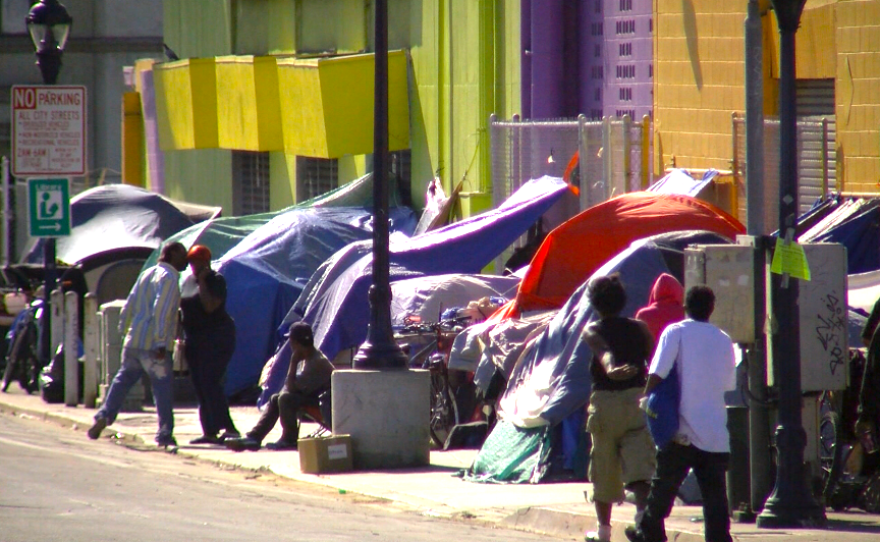Part 3 of a series
Editor's note: This is the third story in a three-part series. Here are parts one and two.
On his campaign website, San Diego District Three Councilman Chris Ward said he ran to improve the neighborhoods that make San Diego special and unique. One of the neighborhoods in his district is the East Village — the heart of the homeless crisis.
Ward's constituents in the 130-block community include hundreds of homeless people who are living in conditions that seem to grow more dire by the day.
RELATED: Advocate Wages Social Media Campaign Against San Diego's Homeless Enforcement
“There definitely has been a skid row feel for some of the corners of the East Village,” Ward said, “and other places where homeless individuals have already been present for a number of years, and it’s just getting to be pretty intense.”
Ward, who was elected to the council last June, devotes much of his time to talking to the poverty-stricken residents and their advocates, and accompanying police outreach teams to find solutions. He also serves on the newly formed board of the Regional Task Force on the Homeless.

“That’s helping to inform me in the role that I have as a policy maker and as someone who also helps to guide budget decisions,” he said. “It’s helpful to see firsthand.”
Amid a major building boom of highrises and businesses in the East Village, homelessness is skyrocketing and encampments have mushroomed. The chaos is deterring some residents and businesses from moving there, and prompting some current residents to relocate.
“I’ve had a number of people who are residents of downtown who are ready to move out of downtown,” Ward said. “And that’s not okay.”
RELATED: Policing San Diego Homeless Is Much More Than Citations, Says Assistant Police Chief
It is also not okay to push homeless people away without giving them a sufficient place to go, he said.
Ward and other elected officials have pledged to add thousands of permanent housing units to get people off the streets, but in the meantime, the city is struggling to manage the unsightly crisis.
“We definitely need to appreciate and recognize that we have policies, we have laws on the books that we do keep our sidewalks clear and any members of the public are able to walk around the neighborhood unimpeded,” Ward said.
Keeping the sidewalks clear requires the 1,300 people who sleep on the stretches of cement to pack up and relocate daily. Ward said it is important for sanitation.

“A lot of these are not just for access but also for public health reasons,” he said. “We don’t want a field of debris just taking up a street or a neighborhood.”
But homeless people say it is an exhausting process. And if they don’t go they risk encounters with police. Enforcement typically starts with a warning, then can lead to citations and arrests.
“I see both sides,” Ward said. “We have to parse out when somebody has not been responding to a lawful order being given by a police officer.”
He said many policies around homelessness need updating.
“I do agree that it really puts homeless in a hard position when they accrue a number of tickets, that maybe on the front end is a $50 fine, but they don’t have $50 to pay for that,” Ward said.
Over time, unpaid fines can balloon into a warrant or arrest.
“So do we look at a period of amnesty to try to clear the slate for some relatively innocent infractions that have just spiraled out of control for these individuals? Because these are the kind of impediments that they’re faced with trying to get themselves back onto solid footing and get on with their lives,” Ward said.
Another issue is weekly homeless sweeps, which the city calls “abatements.” Police and city workers arrive at particular East Village streets every Monday morning to clean, after posting warning signs three days in advance. People are forced to clear their belongings from the sidewalk or risk losing it, or receiving citations.
“It’s not because we’re trying to confiscate and get rid of people’s belongings,” Ward said. “That’s stuff that would otherwise work its way into the stormwater system or can fester over time.”
The weekly sweeps net an average of 7 tons of waste, a city spokesman said. Ward recently observed the process.
“It’s not that it’s not working entirely, it’s just not working for everybody,” Ward said.
“It’s a real challenge, given the limited resources we have to be able to manage the situation on the ground and do so in a way that both protects the needs of the public health and our community,” Ward said. “But also respects those individuals that are just trying to protect their belongings.”
Ward said one challenge is the amount of resources the process requires, including the use of police officers who bag and tag encampment items.
“Is that the best expense of our uniformed police officer’s time and resources?” Ward said. “Is to have them do jobs like that, to perform tasks like that that perhaps a different kind of social worker or another kind of trained professional would be able to do?
Ward said policies tied to homelessness will soon be reviewed by a new city council committee that will be devoted to homelessness. He plans to take an active role.
“We will be able to have a more focused effort on all of the policy questions,” he said. "Whether they’re decriminalization questions, whether they are police resource questions, whether they are our overall comprehensive strategy.”






